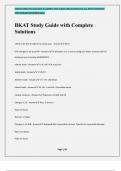EMILLYCHARLOTTE 2024/2025 ACADEMIC YAER ©2024 EMILLYCHARLOTTE. ALL RIGHTS RESERVED
FIRST PUBLISH SEPTEMBER 2024
BKAT Study Guide with Complete
Solutions
What to do first if patient has chest pain. - Answer✔✔-Rest!
ECG changes in an acute MI - Answer✔✔-ST elevation in 2 or more contiguous leads. Ischemia d/t full
thickness loss of muscle. EMERGENCY.
Inferior leads - Answer✔✔-II, III, aVF. RCA occlusion.
Septal leads - Answer✔✔-V1 & V2.
Anterior leads - Answer✔✔-V1 - V4. LAD lesion.
Lateral leads - Answer✔✔-V5, V6, I, and aVL. Circumflex lesion.
Cardiac enzymes - Answer✔✔-Troponins, CK-MB, and CK
Changes in CK - Answer✔✔-Rise: 3-6 hours
Peak: 24 hours
Normal: 3-4 days
Changes in CK-MB - Answer✔✔-Released after myocardial necrosis. Specific for myocardial damage.
Rise: 3-12 hours
Peak: 24 hours
Page 1/18
,EMILLYCHARLOTTE 2024/2025 ACADEMIC YAER ©2024 EMILLYCHARLOTTE. ALL RIGHTS RESERVED
FIRST PUBLISH SEPTEMBER 2024
Normal: 2-3 days
Troponin I - Answer✔✔-Protein found in cardiac muscle. High sensitivity.
Rise: 3-12 hours
Peak: 24 hours
Normal: 5-10 days
Troponin T - Answer✔✔-Protein found in cardiac muscle. High sensitivity.
Rise: 3-12 hours
Peak: 12-48 hours
Normal: 5-14 days
Common conditions that cause a murmur - Answer✔✔-Aortic dissection, aortic regurgitation (both acute
& chronic), mitral valve regurgitation (both acute & chronic), mitral valve stenosis
Drugs to decrease afterload/SVR/PVR - Answer✔✔-(Arterial Dilators) Nitroprusside, nitroglycerin,
amrinone, alpha (Regitine) & Ca channel blockers
Drugs to increased afterload/SVR/PVR - Answer✔✔-(Vasopressors) Epinepherine, norepinepherine,
dopamine, neosynephrine
Drugs to decrease contractility/SVI - Answer✔✔-Beta blockers (atenolol, metoprolol, propranolol,
labetolol, esmolol) and Ca channel blockers
Drugs to increase contractility/SVI - Answer✔✔-Positive inotropes, dobutamine, dopamine, milrinone,
and digoxin
Page 2/18
, EMILLYCHARLOTTE 2024/2025 ACADEMIC YAER ©2024 EMILLYCHARLOTTE. ALL RIGHTS RESERVED
FIRST PUBLISH SEPTEMBER 2024
Drugs to decrease preload/CVP/PAWP - Answer✔✔-Venous Dilators - Nitroglycerin, nitroprusside,
amrinone, alpha & Ca channel blockers
Diuretics - Furosemide, bumex, mannitol
Drugs to increase preload/CVP/PAWP - Answer✔✔-Volume - Colloid, crystalloids, blood, hetastarch
Dysrhythmia control - antirhythmics, pacemaker, AICD
Complications when using thrombolytics - Answer✔✔-Allergic reaction, bleeding/hemorrhage, stroke
Failure to capture - Answer✔✔-Pacer delivers a stimulus at the appropriate time but no depolarization
occurs. No P or QRS wave after pacer spike.
Failure to fire/pace - Answer✔✔-No pacer spikes seen
Failure to sense - Answer✔✔-Pacemaker does not detects heart's intrinsic activity or interprets
noncardiac activity as intrinsic activity. Spikes in inappropriate times.
Normal PR - Answer✔✔-0.12 - 0.20
Normal QRS - Answer✔✔-0.04-0.10
Normal QT - Answer✔✔-Less than 0.48. Varies by age, HR, and gender.
Vasopressors - Answer✔✔-Epinepherine, norepinepherine, dopamine, phenylephrine/neosynephrine,
vasopressin/pitressin, milrinone/Primacor, dobutamine/Dobutrex
Indication for dopamine/Intropin - Answer✔✔-Acts on SNS to increased HR and BP. Indicated for
hypotension, low CO, decreased renal blood flow. Use if patient is bradycardic.
Page 3/18




